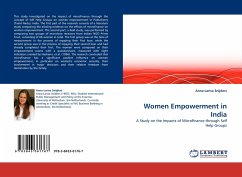Corporate social responsibility projects at "the bottom of the pyramid", that is, the low-income regions of the world, are likely to be short-lived or even harmful to a community. Thus the underlying thesis is building on the concept of contributing to poverty alleviation by encouraging multinational companies to do business with "the bottom of the pyramid". It is argued that women once empowered as entrepreneurs, producers, employees, suppliers or consumers can be the missing link to achieve both long-term poverty alleviation and profit maximization. In light of the huge growth potential for multinationals in rural areas of South Asia, the research focuses on the countryside of India and Bangladesh. While writing the book, the author stayed in Bangladesh, experiencing and observing the challenges and success factors of bottom-of-the-pyramid strategies firsthand to shed light on the hidden potential of women.
Hinweis: Dieser Artikel kann nur an eine deutsche Lieferadresse ausgeliefert werden.
Hinweis: Dieser Artikel kann nur an eine deutsche Lieferadresse ausgeliefert werden.








